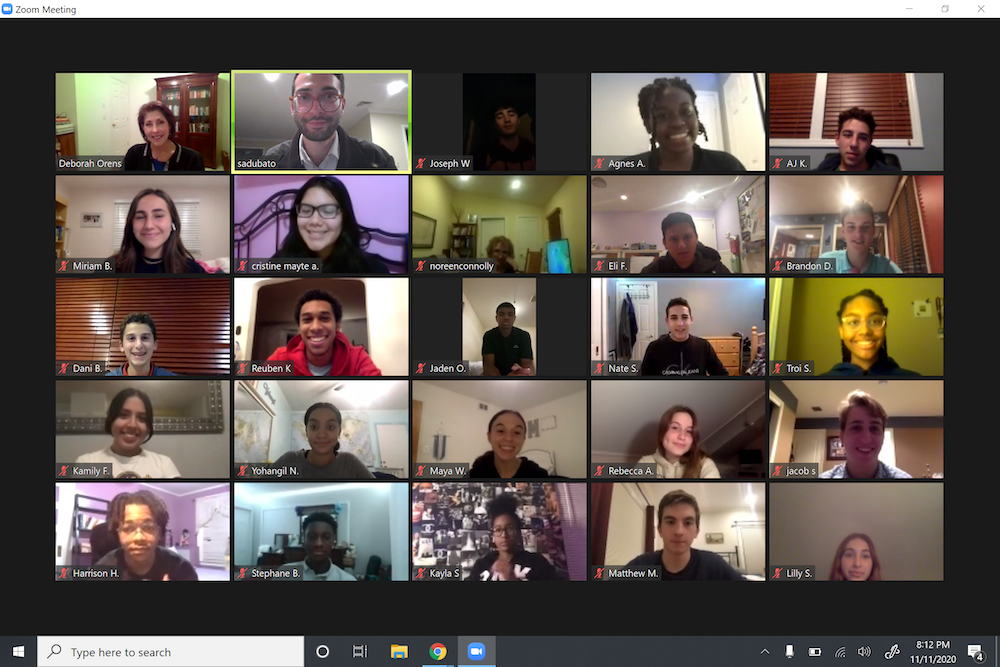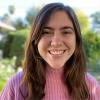Supporters of President Donald Trump gather in front of the U.S. Capitol in Washington Jan. 6, 2021. (CNS/Reuters/Stephanie Keith)
In a virtual interfaith seminar meeting earlier this school year, a Black student from St. Benedict's Preparatory School in Newark, New Jersey, shared that he'd been followed by a police car while skateboarding through a park in a sweatsuit.
"He realized from that day on that if he's ever going to be skateboarding in the park, he needs to watch what he's wearing," said Daniel Bank, another student in the seminar, from Rae Kushner Yeshiva High School in Livingston.
Because Bank is white, he said, he knows he would not seem suspicious to a police officer were he to do the same thing. The disparity made an impression on him. "With instances like that, you can see this line that separates what white people and Black people can do, not because of anything except for the color of their skin," Bank said.
Before the seminar started, Kushner students said they didn't know many Black or Latinx people, and St. Benedict's students said they didn't know many Jews, said Stephen Adubato, a religion teacher who teaches the class with Deborah Orens. Most students at St. Benedict's Prep are Black or Latinx, while Kushner's students are all Jewish.
The seminar has given juniors and seniors from both schools an opportunity to discuss politics, history and race with peers from diverse religious, racial and socioeconomic backgrounds. Its primary goal was to create bridges, said Adubato.
Thematically, the seminar has focused on the similarities and differences between racism and anti-Semitism, and on the history of both, said Orens. Students have read Hannah Arendt's Eichman in Jerusalem and James Baldwin's "Letter from a Region in My Mind," studied redlining and disenfranchisement, and discussed how the Nazis' Nuremberg Laws were inspired by Jim Crow policies.
In their first online meeting after the Jan. 6 attack on the U.S. Capitol by a mob of Trump supporters, the seminar's students discussed the double standard they saw in how the protestors were met by law enforcement, Adubato told NCR.

Students from St. Benedict's Preparatory School in Newark, New Jersey, and Rae Kushner Yeshiva High School in Livingston, New Jersey, participate in a virtual interfaith seminar meeting. (Provided screenshot)
In the images of the Jan. 6 attack on the U.S. Capitol by a mob of Trump supporters, students saw both racism and anti-Semitism. "The flags people raised at the Capitol hate both of us," said Reuben Kadushin, a St. Benedict's senior.
Kadushin's father is a secular Jew while his mother is Black, he told NCR. For him, the seminar was an opportunity to learn about the lived experience of anti-semitism.
Orens said her students at Kushner were eager to hear firsthand from students outside their own community about their experiences. "They wanted to learn and get out of their bubble a little bit," she said.
"When we were talking about policing, I think our students really got an understanding of how privileged they are," Orens said.
Kadushin said another Black student from St. Benedict's shared that he lives in an area where crime is prevalent, and the police do little to make his neighborhood safer. In contrast, Kadushin said, students at Kushner shared they trust and rely on the police to protect their places of worship from anti-Semitic attacks. "So one sees police as ineffective, and the other sees the police as necessary for stopping real terrorism," Kadushin said.
Politically, the seminar's students are mostly on the same page, aligned with the Democratic Party, Adubato said.
"If we're talking left and right, it's pretty much aligned," Kadushin said of his peers in the seminar. But, as Kadushin noted, students had to choose to take the class in the first place. Since signing up was optional, the students who did so do not necessarily reflect their schools' full political spectrums. There are people who support Trump at Kushner, Adubato said. (The school was founded by Charles Kushner, father of Jared Kushner, Ivanka Trump's husband and a senior advisor to the former president.) "Part of me wishes there were some Trump people [in the seminar], so that we could have these hard conversations with each other," Adubato said.
One student from Kushner did ask, "What is the Biden administration going to do to continue the good work that Trump has been doing for Israel?" when New Jersey Senator Cory Booker visited the class virtually, Adubato recalled, but no deep impasses emerged between the students in the class.
Advertisement
The most significant difference of opinion was over policing, Kadushin and Bank said, but students came to understand each other's perspectives on that issue. "There have definitely been times where we've diverged on different issues. We all looked at it like there shouldn't be police brutality and we need to end it, but then when it came to approaches we kind of diverged," Bank said. Some St. Benedict's students are in favor of defunding the police, while Kushner students feel that police are integral to security, he explained.
A Kushner parent initially came up with the idea for the class, wanting to continue the legacy of his mother, a Holocaust survivor, Adubato said. He brought the idea to Rabbi Eliezer Rubin, Kushner's head of school, who then reached out to Benedictine Fr. Edwin Leahy, the St. Benedict's headmaster.
Bank told NCR the seminar impacted how he sees and understands the world. "It really helped me broaden my horizons and expose me to other people's perspectives and their narratives — I find that today so much of what we hear is based on people who are similar to us," Bank said. (After the events of Jan. 6, students expressed interest in taking a class on detecting media bias and unreliable information, Orens said.)
"You get to see different points of view and see that we're ultimately the same," said Sekou Diabate from St. Benedict's, the only Muslim student in the seminar.
In the next few weeks, Adubato and Orens will assign students in small groups to get involved with some of the social issues they have discussed in the class, like redlining, voting rights and climate change. Unfortunately, none of the students from the two schools have been able to meet in person because of the pandemic, the teachers said, but they plan to hold the seminar again next year, and hopefully take students to Washington to visit the Holocaust Memorial Museum and the Smithsonian's National Museum of African American History and Culture.
"The fact that we're doing the seminar at all — that's already a change, that's already going against the spirit of what happened at the Capitol," Adubato said. "Systemic change has to happen, but nothing is going to be fruitful until we first learn to talk to each other, be with each other."
"I found it very meaningful that after a day that you could say was caused by people that were only listening to what they wanted to hear, we were able to come together and discuss different opinions," Bank said.
Kadushin told NCR he believes students in the class may sometimes refrain from being completely honest, but he praised the seminar for trying to provide a space for open dialogue between students from different backgrounds. "This [seminar] wouldn't be an accomplishment between the schools if it wasn't something that was difficult to do," he said.





